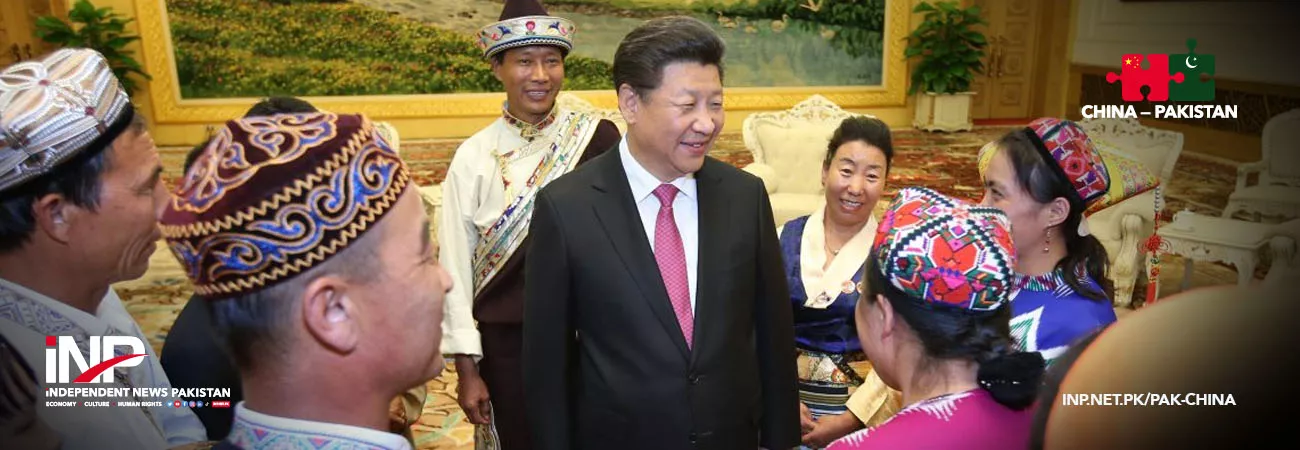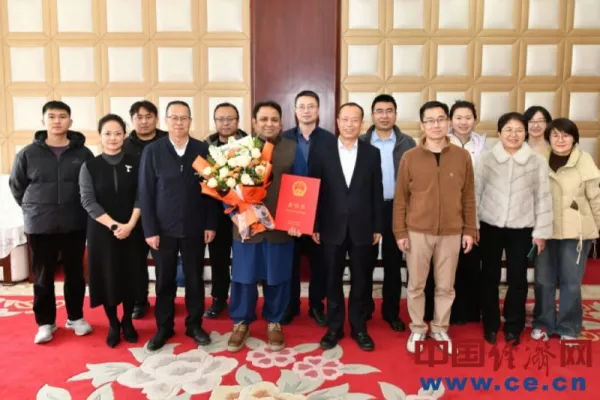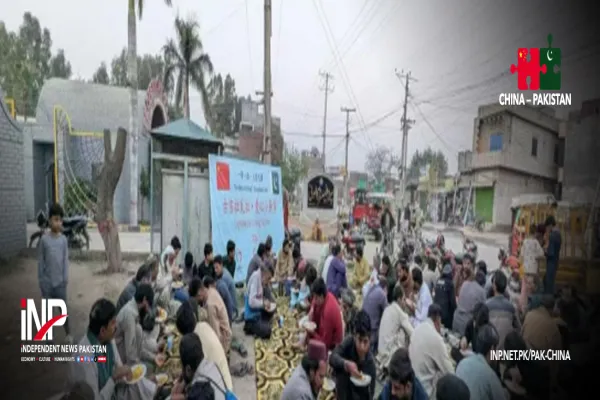i NEWS PAK-CHINA
BEIJING: The CPC's ethnic policies are built upon the goals of forging a keen sense of national identity, maintaining territorial integrity and national unification, and achieving common development and prosperity through the joint efforts of all ethnic groups. It was learnt on the visit of an exhibition on prosperity of ethnicities in China arranged by the China NGO Network for International Exchanges for a wide range of delegation belonging to different countries.
In a briefing, Qiu Peng, deputy secretary general of China Ethnic Minorities Association for External Exchanges said that China is a unified multiethnic state. The system of regional ethnic autonomy means that areas with large ethnic minority populations can practice regional autonomy, establish autonomous organs, and exercise the power of self-government under the unified leadership of the state. This basic political system is specified in the country's Constitution and its Law on Regional Ethnic Autonomy.
China's regional ethnic autonomy is autonomy under the unified leadership of the state. Territorial integrity and national unification are preconditions and foundations for regional ethnic autonomy, which combines unification with autonomy and ethnic factors with regional factors, and are thoroughly suited to China's realities, Qiu Peng told.
In the exhibition, it was observed that all ethnic autonomous areas are inseparable parts of the country, and all autonomous organs of these areas are local governments subject to the unified leadership of the central government.
Regional ethnic autonomy provides institutional and policy guarantees to ensure that ethnic minority citizens enjoy rights to equality and freedom, and to economic, social and cultural services. On all standing committees of people's congresses of the 155 ethnic autonomous areas, there are citizens from the local ethnic groups assuming the office of chair or vice chair; all governors, prefectural commissioners, and heads of counties of ethnic autonomous areas are citizens from the ethnic groups.
The central government assists all ethnic minority areas in accelerating their economic and cultural development based on the characteristics and needs of the ethnic minorities there.
The system of regional ethnic autonomy has greatly increased the sense of pride and responsibility of people of all ethnic groups and stimulated their enthusiasm, initiative and creativity in jointly steering the course to a bright future.
Under this institutional framework, communication and exchanges between ethnic groups, and socialist ethnic relations characterized by equality, unity, mutual assistance and harmony, have expanded. Ethnic unity has been reinforced, and a strong sense of national identity has been forged.
The government has substantially reduced poverty in ethnic minority groups and areas. By the end of 2020, a total of 31.2 million people had been raised from poverty in the five autonomous regions of Inner Mongolia, Guangxi, Tibet, Ningxia and Xinjiang, and the three provinces of Guizhou, Yunnan and Qinghai, where many ethnic minorities live.
All members of the 28 ethnic groups, with populations below 300,000, had risen out of poverty, and the ethnic groups which made the direct transition from a primitive to a socialist society in the early years of the PRC experienced another dramatic transformation – from absolute poverty to moderate prosperity.
The incomes and welfare of the registered poor in rural areas have improved substantially. Adequate food and clothing, and access to compulsory education, basic medical services and safe housing have been guaranteed for them. Improvements in education, health care, housing, and access to safe drinking water and other amenities have met their basic needs and also laid the foundations for their future development. Guaranteeing the right of ethnic minority groups to participate in the administration of state affairs. The provisions in the Constitution and laws regarding the representation of ethnic minority groups in the leadership of organs exercising regional autonomy and the election of ethnic minority deputies to the people’s congresses are strictly implemented.
The Electoral Law stipulates that ethnic groups with a small population shall have at least one deputy to the NPC. All 55 ethnic minority groups have deputies to the NPC and members in the CPPCC National Committee. The 13th NPC has 438 ethnic minority deputies, accounting for 14.7 percent of the total. Raising the living standards of ethnic minority groups and areas. Special programs have been launched, and policies and measures have been implemented to boost the economy of ethnic minority areas, such as the development of the western region, the action plan to bring prosperity to border areas and their residents, paired assistance between developed areas and less developed ethnic autonomous areas, special support for ethnic groups with small populations, and preservation and development of ethnic minority villages and towns.
Between 2018 and 2020, the five autonomous regions of Inner Mongolia, Guangxi, Tibet, Ningxia and Xinjiang, and the three provinces of Guizhou, Yunnan and Qinghai with large ethnic minority populations recorded faster economic growth than the national average. The per capita disposable income of their residents increased from RMB150 in 1978 to RMB24,534 in 2020.
Developing education in ethnic minority areas. China has adopted a series of measures to promote educational equality and ensure ethnic minorities’ right to education.
These measures include opening more schools in ethnic minority areas, offering preparatory courses or special classes at secondary schools and universities to ethnic minority students, running boarding schools in farming and pastoral areas, and developing higher education in ethnic minority areas.
Credit : Independent News Pakistan-INP









